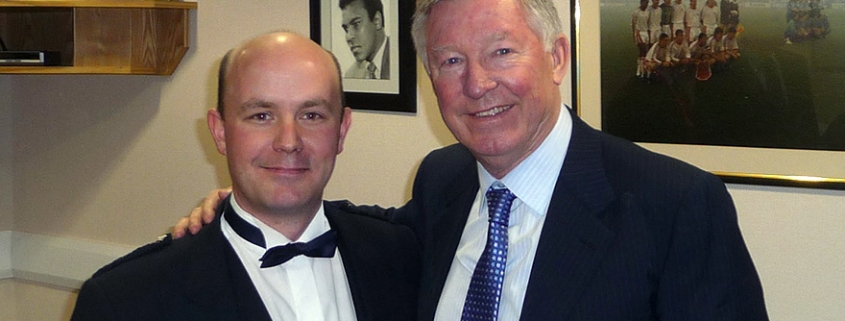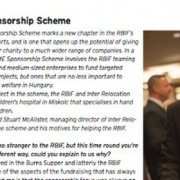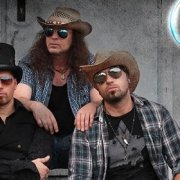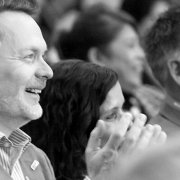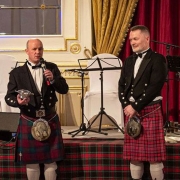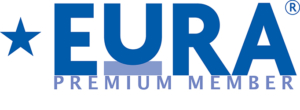Expat portrait: Douglas Arnott, professional translator, Chairman of the RBIF
There are some people who quietly go about their business in the background, almost as an “éminence grise.” They work away and live their everyday lives while improving the fortunes of others.
Scottish-born Douglas Arnott, owner of a professional translation office and a translator/interpreter himself by profession, is one such person. Besides his significant daily workload, he is the Chairman of the Robert Burns International Foundation.
Alongside the Burns Supper charity event, he regularly participates in other charity activities. He puts just as much heart and soul into helping as he does into his profession of translation.
We sat down for a chat about expat life, his career, and what motivates a professional like him in Hungary.
Today, you’re a father to three children, the owner of a significant translation agency, and the chairman of one of the largest charity foundations. Twenty years ago, is this where you thought you would be today?
20 years ago, I was still coming to the end of my degree in Edinburgh and hadn’t put much thought into what I wanted to do with it.
Having been trained in translation and interpreting, working abroad was clearly an option, even a likely option, but I don’t think I really believed I would still be here after almost 20 years.
You are renowned for your precision and high professional standards. Did you start your career here in Hungary?
After graduating, I spent another 4 weeks in Scotland before catching a flight out to Budapest, ostensibly to start a job here, which eventually came to nothing. Rather than head back home, I decided to set up shop by myself, establishing EDMF initially as a limited partnership (Bt.).
I used up the rest of my student loan to buy a PC, a printer, and a fax machine, and I waited for the phone to ring. So it was a slow start to the business. Translation is very much a service based on trust, and that trust has to be earned, which is difficult when people have no idea who you are.
Back in 1998, the online translation industry was nowhere near as developed as it is today, so initially EDMF was quite reliant on “local” business, but things soon picked up.
‘Cherchez la femme’ – as the saying goes. I believe an exceptional lady “enticed” you here to Hungary and has since become your wife.
Zsuzsa is well-versed in the profession too, and you run your translation agency together. How did you divide up the work with Zsuzsa?
That’s right, there was a reason for me jumping on the plane to Budapest back in 1998! I spent a year with EDMF and then almost six years working in-house at the translation department at KPMG Hungary before leaving in 2005 and devoting myself fully to EDMF again.
It was probably a couple of years after leaving KPMG and after our three kids arrived that Zsuzsa began to help out with the firm. I handle the professional side of the business; she coordinates the admin and back office, including marketing and social media.
Many people have said to us that they couldn’t imagine working side by side with their spouse. While it’s not always plain sailing, we have a system that works in the office, and more often than not, we’re able to leave our work minds behind when we head home.
How would you describe your everyday life?
Active! EDMF is growing, but we all have to be great at multi-tasking as everyone has not just one or two but many different tasks that need to be completed every day.
My time in the office is limited by when I have to drop the kids off at school in the morning and when they need picked up in the afternoon following whatever extracurricular activities are scheduled for that day, and there are a lot of them! This means the time spent in the office has to be as efficient as possible.
There are also periods of the year when the Robert Burns International Foundation takes up a lot of my time, giving me a few more balls to keep in the air. This is when I need to be particularly good with how I split my schedule, and Zsuzsa plays as much of a part in the RBIF from that point of view as I do.
EDMF, which you own, has today become one of the most professional translation agencies, operating for 19 years with clients in more than 20 countries and with 150 translators. How did you build up such a prospering business in Budapest?
We made a decision early on that quality would be what stood us apart on the market. This meant we concentrated on working with smaller teams of linguists, as opposed to the mass approach followed by many other companies in the industry.
Consequently, we were able to pay close attention to meeting our internal standards, and clients came to appreciate and value the consistent level of quality we provided. Over the years we have enjoyed steady growth that has enabled us to adapt and adjust to as we see fit, without having to take radical or risky decisions.
I think stability and reliability has been one of EDMF’s key factors of success over the last 19 years.
Do you consider yourself successful, what makes you happy?
What makes me happy – is sipping a glass of wine at home in the garden too simplistic an answer? It’s not that far from the truth though, what with our three kids, the company and the foundation, our lives are anything but slow and boring.
I grew up in Scotland’s biggest city, Glasgow, and loved it, but over the years I’ve come to value living outside the city. Etyek, from that point of view, is perfect. And the fact I can enjoy living there with everything we need as a family I guess means I can tick success off the list as well.
Besides your family and your business, you also participate in charity activities. These are clearly important to you. Do you want to give something back to the community, or does something else motivate you?
I grew up in an extended family full of doctors: a GP and a plastic surgeon for grandfathers, an uncle as a vet, and my sister and brother-in-law are both consultant physicians in the UK. While the medical genes passed me over, when I learned the Robert Burns International Foundation supported sick and underprivileged children in Hungary it just seemed like something I should be doing.
That was back in 2012, and now as Chairman of the RBIF I’m proud of what we have achieved over the last five years and indeed what we continue to do.
Last year we supported hospitals in Budapest and around the country as well as joining forces with the Caledonia Bar to help a nursery in a very poor village in northern Hungary. We have also launched a scheme helping SMEs get involved in supporting charitable causes with the help of the RBIF, with Inter Relocation the first company to sign up, on the initiative of Stuart McAlister.
As expats I think we can live quite a sheltered existence sometimes in Hungary, and it’s with projects like these where we can and certainly should do as much as possible to better the lives of those who have not been as fortunate as we are, especially when it comes to enjoying good health.
What are your plans for the future? Where do you see yourself in 20 years?
Let me see, in twenty years’ time, preferably retired and on an exotic golf course somewhere.
More realistically, I’ll be happy if EDMF has continued to go from strength to strength. I took up wine-making as a hobby a few years ago and will soon be bottling my fourth ‘vintage’.
The problem with making wine is that when you mess up you need to wait a whole year before trying not to make the same mistake again. I should know, I’ve made a lot of mistakes. Slowly but surely though I feel happy for others to taste the end product. Not enough to contemplate a career change though, I’ll leave that to the professionals.

